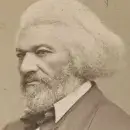
Frederick Douglass
Frederick Douglass was born into slavery in Maryland and escaped in 1838 to become one of the most important leaders of the movement for African American civil rights in the nineteenth century. Serving as an agent of both the Massachusetts and American Anti-Slavery societies, Douglass traveled the country and provided personal witness in the cause of abolition. In 1845, Douglass published his first autobiography, Narrative of the Life of Frederick Douglass, an American Slave, Written by Himself. Douglass would publish two additional autobiographies: My Bondage and My Freedom (1855) and Life and Times of Frederick Douglass (1881). In 1847, Douglass established The North Star, a newspaper in Rochester, New York. In 1851 the paper merged with the Liberty Party Paper to form Frederick Douglass’ Paper, which ran until 1860. Douglass would publish two additional newspapers during his life: Douglass’ Monthly (1859–1863) and New National Era (1870–1874).
During the Civil War, Douglass recruited soldiers for the Massachusetts 54th, the all-Black infantry regiment in which his sons Lewis and Charles served. In 1863, he met with President Lincoln to advocate for better pay and conditions for the troops. In 1874, he was appointed president of the Freedmen’s Savings & Trust, also known as the Freedmen’s Bank. He became the first Black U.S. marshal, appointed for the District of Columbia by President Rutherford B. Hayes. He served in that capacity until 1881, when President James A. Garfield appointed him as recorder of deeds for the District of Columbia. In 1889, President Benjamin Harrison selected Douglass as the U.S. minister resident and consul general to the Republic of Haiti. Douglass disagreed with the Harrison administration over seeking a naval base in Haiti, and resigned in 1891.